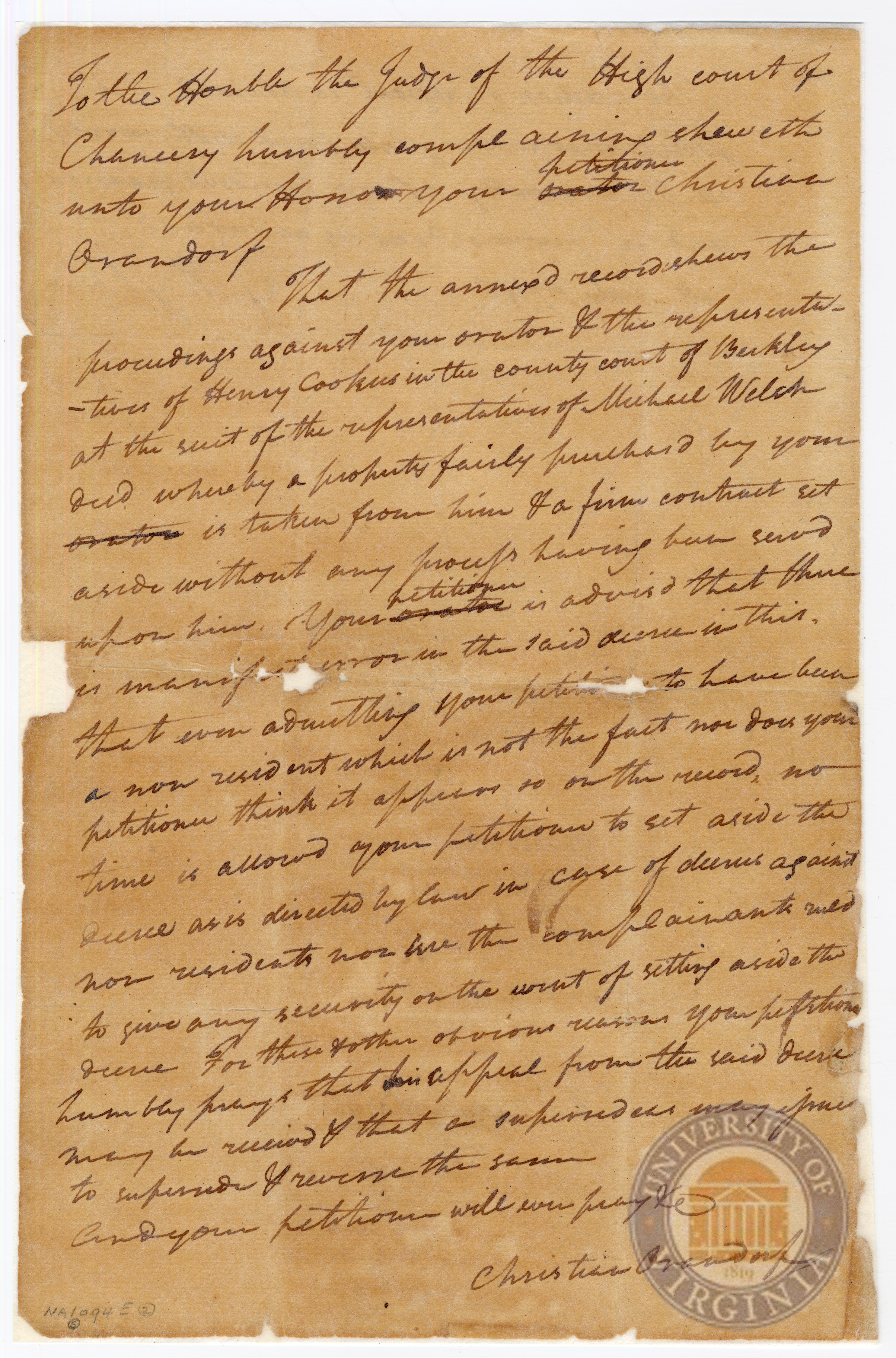Orandorf v. Welch
Orandorf v. Welch (February 18, 1792) is a brief decision by Wythe as Judge of the Hight Court of Chancery granting Orandorf's Petition of Appeal and awarding the petitioner a supersedeas bond.[1] Orandorf's Petition of Appeal is written in John Marshall's hand and was filed on Orandorf's behalf by Marshall in the High Court of Chancery in 1792.[2]
Background
The representatives of Michael Welch's estate sued Orandorf and the representatives of Henry Cookus in Berkeley County Court. A decree from the court had set aside Orandorf’s purchase contract for property in Berkeley County, and Orandorf's petition alleged the property had been purchased fairly and his firm contract set aside without notice.
Orandorf's petition alleged manifest error in the court’s decree and argued that even if Orandorf had not been a resident of Berkeley County -- which Orandorf insisted was untrue -- Orandorf had had no time to set aside the decree, as allowed by the law in the cases of decrees against non-residents. Additionally, Welch had offered no security in the absence of an opportunity to set aside the decree.
Orandorf petitioned for an appeal from the decree to the High Court of Chancery and asked the Court to issue a supersedeas bond to reverse and supersede enforcement of the decree.
The Court's Decision
With minimal discussion, Wythe granted the petition of appeal and awarded Orandorf a supersedeas bond, with surety, in the penalty of £100. According to the court clerk's handwritten notes, the case was subsequently continued until September 1792, when Welch's representatives filed an answer and were awarded a general commission to take testimony.[3]
Additional Information
According to John Marshall's Account Books, Marshall received four separate payments from 1790-1795 for his representation of Christian Orandorf in this matter. The first payment of £5 is listed as having been received on May 21, 1790,[4] suggesting that Marshall may have represented Orandorf in the Berkeley County Clerk. After filing Orandorf's Petition of Appeal in 1792, Marshall received a payment of £6.[5] Marshall's Account Book for 1795 indicate that Marshall received two payments related to this matter that year, first in March 1795 for £3[6] and next in May 1795 for £30.[7] This final payment was received around the time that Marshall witnessed a receipt dated May 13, 1795, indicating that Christian and Stuffell Orandorf had paid the administrator of Welch's estate, John Littlejohn, £66 11s. 1d. This receipt suggests that Orandorf lost his case against Welch on appeal.
Document Text
Page 1 (Orandorf's Petition of Appeal, by John Marshall)
Page 2 (George Wythe's Grant of Orandorf's Petition of Appeal, 18 February 1792)
Page 3 (John Littlejohn's Receipt of Orandorf's Payment, Witnessed by John Marshall, 13 May 1795)
See also
References
- ↑ Petition of Appeal by Christian Orandorf (Feb. 18, 1791) (on file with the Arthur J. Morris Law Library Special Collections, The John M. Woolsey Collection of Legal Documents, Box 1, Documents in the Case of Orandorf v. Welch with signatures of George Wythe and John Marshall), available at http://archives.law.virginia.edu/records/mss/78-6/digital/1114.
- ↑ Orandorf v. Welch's Administrators, Petition of Appeal, in 2 The Papers of John Marshall: Correspondence and Papers, July 1788—December 1795; Account Book, July 1788—December 1795 110 (Charles T. Cullen & Herbert A. Johnson, eds., 1977) [hereinafter Marshall Papers].
- ↑ Id.
- ↑ Accounts: 1790, Receipts, May 21st, Orendorf v. Cookus, supra note 2, at 393.
- ↑ Accounts: 1792, Receipts, February, Orandorf v Cookus, supra note 2, at 433.
- ↑ Accounts: 1795, Receipts, March, Littlejohn v Cookus (in Orandorf v Cookus), supra note 2, at 487.
- ↑ Accounts: 1795, Receipts, May, Orandorf, supra note 2, at 489.
